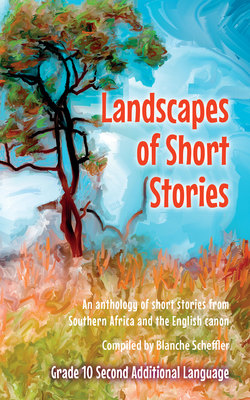Читать книгу Landscapes of short stories for Gr 10 Second Additional Language - Blanche Scheffler - Страница 12
На сайте Литреса книга снята с продажи.
Mosquitoes in Australia
Оглавлениеa tall tale adapted by Dennis Pepper
A note about the story
Tall tales are absurdly exaggerated stories that are told or written to amuse. They are outlandish fantasies of what is quite obviously impossible. Much of the fun comes from the narrator’s tone and the way in which he or she uses details for effect.
This story has all the characteristics of the tall tale – and more: four fellows each take a turn at telling an ever bigger tall tale about mosquitoes than the previous speaker did. All four exaggerate, all four use imagery to create a picture of the size of the mosquitoes they have come across (a fiction in itself), and all four sound serious, but are probably not. Their language and pronunciation are the informal, colloquial language of ordinary men. One by one the descriptions of the mosquitoes increase the size and suggested ferocity of the insect, leading up to a climax in the last speaker’s anecdote. The four speakers share the stage, but the main characters are the mosquitoes.
Pre-reading
•What do you know about mosquitoes? Do you think there is anybody in the world that actually likes them? Why is this so?
During reading
•Note the different areas the speakers mention. Why would this be an important detail?
•Which phrase in paragraphs two and three indicate that the speaker is trying to outdo what the man before him said?
Mosquitoes in Australia
A group of country men were discussing mosquitoes in King William Street, Adelaide, one Tuesday evening. ‘Yas,’ said a burly northerner, ‘I ain’t seen no skeeters26 to equal them we ’ave up above. Now, look ’ere; there’s an old stagnant27 dam on my farm, and at night yer ken hear the skeeters splashin’ about in the water like birds. In fact, a new ’and28 I got last week shot a couple of ’em just afore dark one night, thinkin’ they was ducks.’
‘That’s nothing,’ observed a thin, sunburnt little man with a squint29; ‘over round Lake Wangary, on the west coast, yer can ’ear ’em goin’ to roost on the fences at night. They make the wires twang like banjos; straight iron.’
‘Wal,’ said a lanky individual, whose chief adornments were bell-bottomed trousers and an enormous tent of a hat, ‘yer wanter go along the Murray for them insects. On that strip of wetness yer git ’em big and good. ’Tain’t nothin’ jest ’afore sundown to see a moskeeto dive into the Murray and come up and fly away with a 20-lb. cod. They never miss ’em!’
The last man now chipped in – a stout, dark person in a cork fly net. ‘Sorry to ’ear yer’ve got sech small miskeeters in your districts – very sorry, indeed. Now, if yer want real sizeable miskeeters jest go across to Yorke Peninsula. They seen to fatten up wonderful on Cornishmen. I was campin’ over there in a tent last week, and about midnight I was woke up by a hummin’ noise, like a motor car doin’ a record, and next minute a small miskeeter settled on me chest. “’Ere,” I yelled to me mate, “give us a ’and; there’s a miskeeter dropped on me.” “Well, knock ’im off,” ’e sez. “ ’Ow ken I30,” sez I, “when ’e’s got both me ’ands pinned down!” ’
Post-reading
1.State a reason why the new man (the ‘and) would think that the mosquitoes were ducks.(2)
2.Outline how the stories build up towards a climax.(6)
3.What do the following similes suggest about
a) the mosquitoes and
b) the speaker in each case?
i)like birds
ii)like a motor car doin’ a record(4)
4.Comment critically on the different speakers’ intentions.(2)
5.Briefly comment on the effectiveness of the conclusion and briefly explain what impact it probably had on the other three speakers.(6)
Enrichment activity
Take turns to tell a tall story or joke, using dialogue to make the joke more dramatic.
